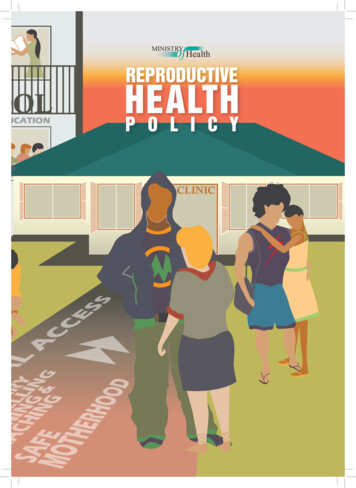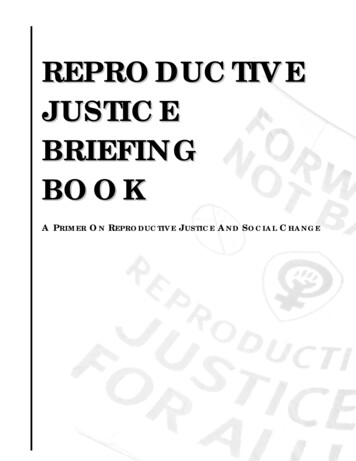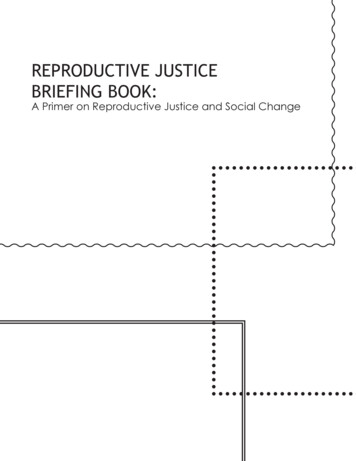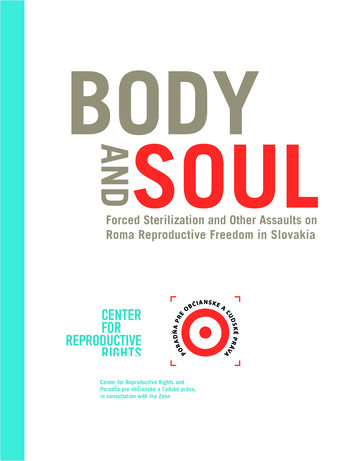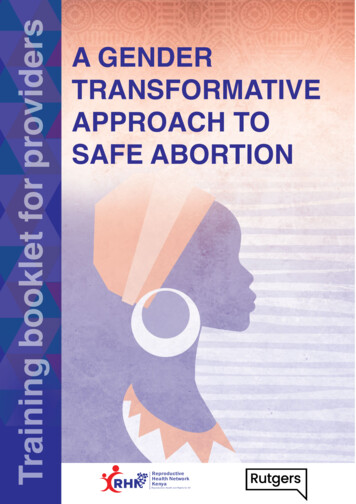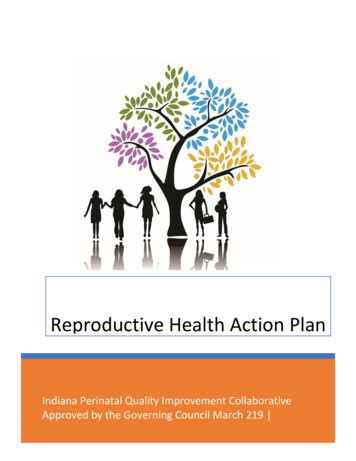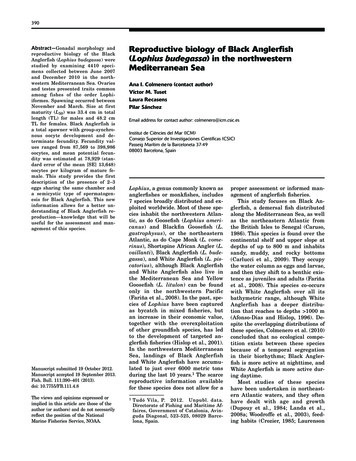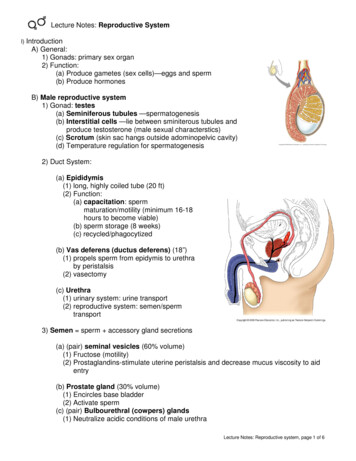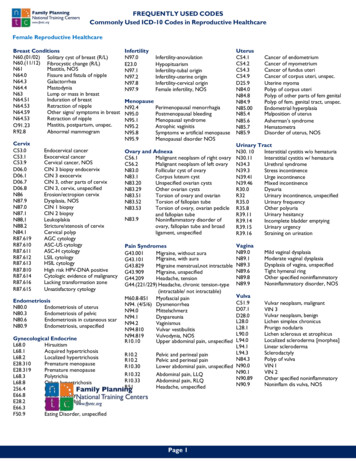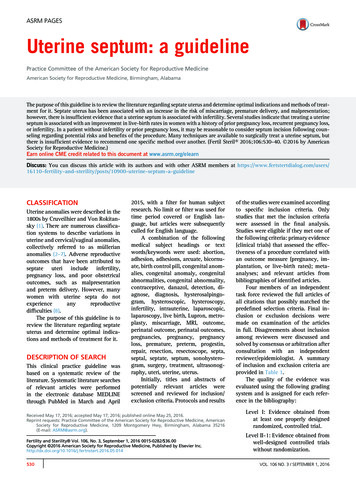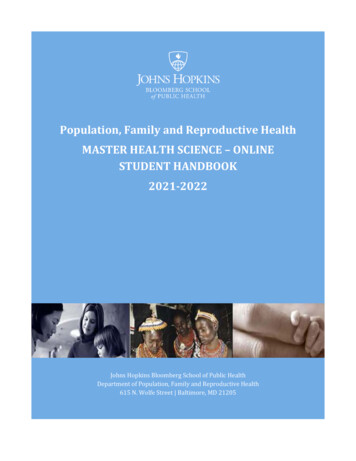
Transcription
Population, Family and Reproductive HealthMASTER HEALTH SCIENCE – ONLINESTUDENT HANDBOOK2021-2022Johns Hopkins Bloomberg School of Public HealthDepartment of Population, Family and Reproductive Health615 N. Wolfe Street Baltimore, MD 21205
MHS Online Program Overview2021-22THE JOHNS HOPKINS UNIVERSITYBLOOMBERG SCHOOL OF PUBLIC HEALTH2021-22 ACADEMIC YEAR CALENDARMEMORIAL DAY HOLIDAYSUMMER INSTITUTESREGULAR SUMMER TERMM May 31M May 24W June 30 – W Aug 25 (40 class days)Registration Begins for Summer Institute Terms . W Feb 10Registration Begins for Regular Summer Term . Th April 1Internet-Based/Part-Time MPH New Student Orientation . Sun June 6Summer Institutes Begin . Begin M May 24Regular Summer Term Registration Ends . F June 25NEW STUDENT ORIENTATION . M June 28– T June 29Instruction Begins for Summer Term . W June 30INDEPENDENCE DAY HOLIDAY . M July 5Regular Summer Add Period. W June 30– T July 6 (full term courses)Regular Summer Drop Period . W June 30– T July 13 (full term courses)Last Class Day of Regular Summer Term . W Aug 25Last Class Day of Summer Institutes . F Aug 271ST TERMM Aug 30 – M Oct 25 (40 class days, M-F)1st Term Registration Begins .*New students can register beginning .1st Term Registration Ends .NEW STUDENT ORIENTATION .Instruction Begins for 1st Term.LABOR DAY .Add Period .Drop Period.Last Class Day of 1st Term .2ND TERMM Apr 26Th July 1F Aug 27W Aug 25 – F Aug 27M Aug 30M Sept 6M Aug 30 – F Sept 3M Aug 30 – F Sept 10M Oct 25T Oct 26 – W Dec 22 (40 class days, M-F)2nd Term Registration Begins .2nd Term Registration Ends.Instruction Begins for 2nd Term .Add Period .Drop Period.THANKSGIVING RECESS .Last Class Day of 2nd Term.Internet-Based/Part-Time MPH New Student Orientation .WINTER INTERSESSION .M Apr 26F Oct 22T Oct 26T Oct 26 – M Nov 1T Oct 26 – M Nov 8Th Nov 25 – Su Nov 28W Dec 22M Jan 3T Jan 4 – F Jan 21Winter Intersession Registration Begins . F Oct 1Winter Intersession Registration Ends . W Dec 29MARTIN LUTHER KING, JR. HOLIDAY RECESS . M Jan 173RD TERMM Jan 24 - F Mar 18 (40 class days, M-F)3rdRegistration Begins forTerm .3rd Term Registration Ends .Instruction Begins for 3rd Term .Add Period .Drop Period.Last Class Day of 3rd Term .SPRING RECESS .4TH TERMM Nov 15F Jan 21M Jan 24M Jan 24 - F Jan 28M Jan 24 – F Feb 4F Mar 18M Mar 21 - F Mar 25M Mar 28– F May 20 (40 class days, M-F)Registration Begins for 4th Term .4th Term Registration Ends .Instruction Begins for 4th Term .Add Period .Drop Period.Last Class Day of 4th Term .PUBLIC HEALTH CONVOCATION .UNIVERSITY COMMENCEMENT .RESIDENCY PROGRAM ENDS .M Nov 15F Mar 25M Mar 28M Mar 28 – F Apr 1M Mar 28 – F Apr 8F May 20T May 24Th May 26Th June 302021-2022 PFRH MHS Online Student Handbook2
MHS Online Program Overview2021-22Table of ContentsPart I – GENERAL INFORMATION 4PFRH General Information 5JHSPH Academic Policies and Procedures 7Regulations for PFRH Students 8Institutional Review Board Research Project Approval Procedures 10JHSPH Travel Abroad Policy 13PFRH Teaching Assistant Policy 14PFRH Policies & Forms 16PART II – MASTERS STUDENTS HANDBOOK 21MSH Program Overview 22MSH Course Requirements 23PFRH Areas of Interest Requirements for MSPH 26MSH Essay and Presentation Guidelines 35PART III – PFRH CERTIFICATE PROGRAMS 43Part IV – APPENDICES 45Appendix - Masters Essay Topic Form 54Appendix - Reader Approval Form 55Appendix - Master’s Essay Distinction Award Nomination Form 56Appendix - Essay Template 58Appendix- PFRH Courses by Term, Area of Interest and Certificates 612020-2021 PFRH Academic Calendar of Activities 652021-2022 PFRH MHS Online Student Handbook3
MHS Online Program Overview2021-22Part I –GENERAL INFORMATION2021-2022 PFRH MHS Online Student Handbook4
MHS Online Program Overview2021-22PFRH General InformationA. Education OfficeThe education office is your first point of contact for most questions regarding academic student-related matters.Donna Strobino, PhDVice Chair of Educationdstrobi1@jhu.eduRoom E4650Tel: 410-502-5451Gilbert MorganAcademic Program Managergmorga13@jhu.eduRoom E4005Tel: 410-614-6676Kristen McCormickAcademic Program Administratorkmccor14@jhu.eduRoom E4014Tel: 410-955-1116B. Information TechnologyThe Information Technology Team provides leading edge technology and systems support at JHSPH. Our Anytime-Anywherestrategy means that the School’s information resources are available to the faculty, students, and staff of JHSPH fromanywhere in the world, any time they need them.High quality support is an integral factor in the success of today’s public health professional. The JHSPH InformationTechnology team deploys technology to enhance the productivity, learning and research experience of the School’s faculty,staff, and students.In deploying our Anytime-Anywhere strategy, we make the computing, networking, and communications resources of theSchool available 24 hours a day, 7 days a week, 365 days a year both on-campus and off. The Information Technology teamalso provides comprehensive and customized services to faculty and administrators that streamline and secure survey datacollection, project management, computer purchasing, and networking.All new students will be issued a Johns Hopkins Office 365 email account, which is based on your Johns Hopkins EnterpriseDirectory (JHED) ID. Step-by-step instructions to activate your JHED ID are available here.After your JHED ID is activated, you can set up your Office 365 email account by following the instructions located here.You will be given a JHSPH ID to access JHSPH resources such as the my.JHSPH portal, printing, and the secure wirelessnetwork.Information Technology OfficeRoom: W3014, Wolfe St.Phone: 410-955-3781 (5-3781)Hours: Monday-Friday 8:30 am-5:00 pm (walk in and phone in)Closed weekends and holidays.2021-2022 PFRH MHS Online Student Handbook5
MHS Online Program Overview2021-22C. Departmental SeminarsPFRH holds a noon seminar series every Wednesday 1st through 4th term. PFRH students are required to attend. Theschedule of seminars will be sent in advance via email to all PFRH students and listed in the JHSPH Weekly Calendar. Allgraduating students are required to make a presentation of their thesis results in a formal academic setting, which mayinclude the departmental noon seminar or a professional meeting.D. Departmental Special SeminarsThe department offers special seminars throughout the year (e.g. the Masters’ presentation seminar). Students may berequired to attend additional seminars throughout the year.E. Departmental ServicesPayrollTeaching and research assistant payroll forms can be found online at my.jhsph.edu under the department in the sectioncalled Human Resources and Payroll. All questions regarding payroll including stipends should be directed to pfrhpayroll@jhu.edu. Completed paperwork that cannot be sent electronically should be delivered to the front office – E4527.Students who need to be set up on payroll for stipends payments should email pfrh-payroll@jhu.edu to set up anappointment.Facsimile MachineStudents have access to send and receive local faxes from the departmental fax machine listed below.(410) 955-2303 (Bloomberg School of Public Health building E4527 PFRH Main Office).KitchensThe department has three kitchens available for your use. Refrigerators are cleaned on Fridays at 4:30pm and everythingnot marked with a name and date is thrown away. Please be advised that the refrigerators (and microwaves) aremaintained by our department staff and not housekeeping so please clean up your spills. Also staff, faculty and studentsshare the three refrigerators so please be mindful of space when storing large items.F. ParkingSee Bloomberg School of Public Health: G. Student GroupsSee Bloomberg School of Public Health: ssembly/student groups.html.H. COVID-19 InformationFor academic year 2021-22, many on-site services may not be available during the 1st and 2nd term and possibly extendedthrough the 3rd and 4th term. All such services, however, will be able to be accessed remotely. Information about theseservices and answers to additional resources are listed below.COVID-19 News & Information: ult.aspxFAQs: tudent/By%20Topic.aspxMental Health: Forms/AllItems.aspx2021-2022 PFRH MHS Online Student Handbook6
MHS Online Program Overview2021-22JHSPH Academic Policies and ProceduresThe School’s Catalog and Student Handbook can be found at: http://www.jhsph.edu/student affairs/one stop/.The school’s internal website (“the portal”) resources page, https://my.jhsph.edu/Resources/, houses commonly-neededlinks, including Computer Related Policies, HIPAA Intellectual Property Guidelines, and Office of Communications Policiesand Procedures, as well as information specifically for students.Students should be familiar with the School’s Policy and Procedure Memos (PPMs) for Academic Programs and Students.The PPMs are located on the School’s internal website (“the portal”) s/ppm/Pages/default.aspx.Topics addressed in the School’s Academic Programs:Academic Programs #1Academic Programs #2Academic Programs #3Academic Programs #4Academic Programs #5Academic Programs #6Academic Programs #7Academic Programs #8Academic Programs #9Academic Programs #10Academic Programs #11Academic Programs #12Academic Programs #13Academic Programs #14Academic Programs #15Academic Programs #16Academic Programs #17Academic Programs #18Academic Programs #19Academic Programs #20Academic Programs #21Academic Programs #22Academic Programs #23General PoliciesSchool of Advanced International Studies (SAIS)/Bloomberg School of Public Health Dual Degree ProgramDoctor of Philosophy DegreeDoctor of Public Health DegreeDoctor of Science DegreeContinuing Education CoursesMaster of Public Health DegreeMaster of Health Science Degree - AcademicMaster of Health Science Program for Doctoral Degree CandidatesMaster of Science DegreeMaster of Science in Public Health DegreeRegistration and Acquisition of Course CreditsMaster of Health AdministrationMaster of Science Degree - Interdivisional Program in Clinical InvestigationDoctor of Philosophy (Ph.D.) Degree - Interdivisional Program in Clinical InvestigationMaster of Health Science Degree - Interdivisional Program in Clinical InvestigationCertificate ProgramsMaster of Science Program for Doctoral Degree CandidatesBachelor of Arts/Master Degree ProgramsMaster of Public Policy DegreeMaster of Bioethics DegreeOPAL DegreeMAPHB Online DegreeTopics addressed in the School’s Students PPMs include:PPM Students #1PPM Students #2PPM Students #3PPM Students #4PPM Students #5PPM Students #6PPM Students #7Academic EthicsSpecial Student Status: Regular Special StudentSpecial Student Status: Limited Special StudentsSpecial Student Status: General Preventive Medicine and Occupational Medicine ResidentsPostdoctoral Fellows - Policy Guidelines and ProceduresStudent Conduct CodeStudent Grievance Procedure2021-2022 PFRH MHS Online Student Handbook7
MHS Online Program Overview2021-22Regulations for PFRH StudentsA. Registration PoliciesThe on-line program is designed to be completed in 1-3 years on a part-time basis. While students are not required to beregistered full-time or to enroll in courses every term, students must make a request to their advisor if they do not planenroll in courses for more than two consecutive terms including the reason for the request. Please note that the StudentAccounts office will impose a 100 fee for late registration.Students who find that they cannot complete the program in 3 years will need to petition the PFRH Masters Committee foran extension in the program. This request must include support of the advisor, the reason for the need to extend beyond 3years and a plan for completing the program on a timely basis.B. Satisfactory Academic ProgressPFRH has a rigorous standard for satisfactory academic progress. Students must adhere to the following: Master students must achieve a cumulative GPA of 2.75 for all formal course work.Master students must complete program requirements within the time limits published in the designatedAcademic Program Policy and Procedure Memorandum (PPM).C. Unsatisfactory Academic Progress/Cause for DismissalA failing grade (F) in two or more courses will be cause for dismissal from the PFRH graduate program. The department willpermit a student to remediate one course failure (F). Any student who fails a course will be monitored closely regardingacademic progress.Other causes for dismissal from the program include, but are not limited to, the following: Ethics violationFailure to maintain required GPA and to successfully complete all required coursesD. Departmental Pass/Fail PolicyThe following policies are applicable to PFRH students: Master’s Programs: PFRH requires Master’s students to take all required courses, including required PFRH area ofinterest courses, for a letter grade. Only elective courses may be taken as Pass/Fail option unless otherwise waivedfor the academic term or year by the school. Students should have a discussion with the faculty advisor for takingcourses Pass/Fail.E. JHSPH Courses Taken Prior to Enrollment in Current Degree ProgramStudents who previously took a course at the School of Public Health who wish to use the course to fulfill a currentrequirement must have received a “B” or better and taken the course within the last three years of matriculating into theircurrent degree program. Students who took these courses as an undergraduate may use the courses to fulfill courserequirements but may not receive credit for the course to meet the minimum credit requirement for their current degreeprogram.F. Course Waiver PolicyStudents requesting course waivers must present evidence of prior coursework in the same subject, including, but notlimited to, a syllabus and transcript. No waivers will be granted for courses in which the student received less than a B ordid not receive a letter grade. If a waiver is granted, another course in the same subject must be taken as a substitute.2021-2022 PFRH MHS Online Student Handbook8
MHS Online Program Overview2021-22Required PFRH CoursesStudents wishing to waive 380.604, Life Course Perspectives on Health, must petition the instructors and show that theyhave taken a similar course, demonstrate knowledge of the foundations of a multilevel life course perspective on health,and demonstrate (e.g. through a past course paper) that they understand how to develop a conceptual framework.Students wishing to waive Principles of Population Change (380.600) or Demographic Methods for Public Health (380.603)may do so with the consent of the instructor and with the understanding that they are required to take a higher levelcourse in the same subject area (e.g., Social and Economic Aspects of Human Fertility (380.655) instead of Principles ofPopulation Change or Methods & Measures in Population Studies (380.651) instead of Demographic Methods for PublicHealth).Master’s or doctoral students may petition the Master’s or Doctoral Committee, with consent from their academic advisor,to substitute a course requirement with another course not listed in the requirements. Students should contact theEducation Office with their request; the Education Office will forward the request to the degree program director or courseinstructor, as appropriate. Evidence of having taken a similar course in a previous graduate program or a rationale forsubstituting a course must be provided with the petition. The request will then be reviewed by the degree (Master’s orDoctoral) program committee. The Department’s waiver form can be found under the PFRH Policies & Forms section.Required Courses in Other DepartmentsStudents wishing to waive Epidemiologic Inference (340.721) or Epidemiologic Methods (340.751) may do so by contactingthe Academic Coordinator in the Department of Epidemiology, FranBurman@jhu.edu, at the beginning of the 1st term.Students may waive Epidemiologic Inference or Epidemiologic Methods only if they have completed a graduate level coursein epidemiology with a grade of B or higher. Students will need to take the waiver exam and receive a score of 85% orbetter on the exam. Students who do not pass the exam must register for the course. Students who receive a waiver forEpidemiologic Inference must take a higher-level course in epidemiologic methods.The only Biostatistics course that can be waived is Statistical Methods in Public Health (140.621). Students may petitionthe Department of Biostatistics for a waiver if they can document and demonstrate that they have previously acquired thecourse competencies. The documentation to grant a waiver requires the title of previous courses(s), name of instructor(s),textbook(s) used, course syllabi, and grade(s) received. After review of this documentation, one or more written waiverexaminations may be required. Students wishing to request a waiver should contact the Academic Coordinator in theDepartment of Biostatistics, margo1@jhu.edu, before the start of the 1 term. Doctoral students are required to take theremainder of the Statistical Methods in Public Health sequence (140.622-624) or Methods in Biostatistics (140.651-654).stG. Student’s Responsibilities Regarding DeadlinesIf a student needs to postpone taking an examination or submitting a paper for a PFRH course, the student must make therequest in writing in advance to the course instructor explaining the reason for the request. The ruling made by theindividual faculty member is final about such requests, and there is no appeal process. Original copies of work should beturned in for assignments. The use of e-mail for turning in work is at the discretion of the instructor. It is the student’sresponsibility to ensure that the appropriate faculty member actually receives her/is work.H. Special StudiesSpecial studies provide students with the opportunity for intensive exploration of substantive and methodological issues intheir area of interest under the supervision of a faculty member. Students are encouraged to undertake such opportunitiesin advance of planning their master’s essay or doctoral research. It is expected that doctoral students, however, will beginmore specialized studies after they have completed most course and degree requirements and are developing andimplementing a research topic for their thesis. A special-studies form must be completed by students and faculty withwhom they are working for special studies that are not taken for development of a doctoral research proposal or tocomplete the required MSPH/MHS essay. The form shown below includes the objectives for the special studies and theactivities and deliverables undertaken to meet the objectives along with a timeline and frequency of meetings.2021-2022 PFRH MHS Online Student Handbook9
MHS Online Program Overview2021-22Institutional Review Board Research Project Approval ProceduresThe Institutional Review board (IRB) of the Bloomberg School of Public Health requires review of all faculty and studentresearch involving the use of human subjects.Before beginning contact with either human or animal subjects for research, students, as all researchers, must obtain theappropriate approval for their projects from either an institutional review board (e.g., the Institutional Review board, IRB)or the Institutional Animal Care and Use Committee (IACUC). In both cases, the faculty mentor must be involved in thisprocess in that the protocol for the research project is submitted under the faculty’s name with the student listed as astudent investigator. NO contact can be made with humans, human tissue, human samples or human records without priorapproval of the protocol by the IRB. NO animals can be purchased for the experimentation without an IACUC protocolapproval.It is important for students to make sure that they are either listed on their mentor’s approved protocol or have obtainedapproval for their research protocol, in collaboration with their mentor before starting their research.Information about the IRB committee can be obtained at the Office for Research Subjects in Suite W1100 in BloombergSchool of Public Health building. Students who are conducting original and independent research - under the direction ofJHMI faculty advisers - that involves human subjects must have their proposed project approved by this committee.When students are using data and other information that was developed by a previously approved JHMI or IRB researchproject, a copy of the previous IRB approval must be forwarded to the IRB in addition to a plan of how the data are to beused in secondary data analysis. If the student will be conducting secondary analysis of data from an existing approvedstudy (refer to IRB list), the student and advisor will complete the IRB short form for approval of a secondary data analysisof the approved data set. The IRB still needs to review and approve how the student plans to use the data and report thefindings from the analysis of the data.For field placement activities outside of JHU, the student’s advisor will review the proposed set of activities to be conductedduring the field placement experience (usually before the placement starts or within the first month of work to assure thatapproval is granted before research begins). If it is difficult to distinguish whether the activities are “practice” or “research”,the student should consult the IRB website about the activities. If necessary after review of the website, a memo describingthe proposed activities should be submitted to the IRB by the student and advisor for an expedited review. The IRB reviewprocess should be completed within two weeks and a decision made as to whether the proposed activity is “professionalpractice” or “research project”.The IRB will advise the student and advisor of their decision and if the scope of the project requires a full IRB application. Inthe circumstance that the IRB determines that an MSPH or MHS student is planning to conduct an activity that meets thecriteria for a research project, the IRB will request completion of a full application for submission to the Institutional Reviewboard. The letter from the IRB and any subsequent communication will be kept in the student’s departmental record.Authorization must also be obtained from the agency/department sponsoring a field placement for the use anddissemination of the data and information in question. If the student plans to publish his/her/he/they work and/or thework is conducted as “research”, a full IRB application must be submitted. Guidelines for preparing an application to theCommittee on Human Research are available in Room W1100 and on the IRB website, onal-review-board/.2021-2022 PFRH MHS Online Student Handbook10
MHS Online Program Overview2021-22Notes: Is it human subjects? Institutional Review Board Research Project Approval Procedures1. “About” means the data provide information about individual living people, not simply collected from individual livingpeople. Key informant data about agencies or other entities (e.g., asking a hospital administrator about wait times in theER, asking a drug manufacturer about dispensing patterns) or from experts or opinion leaders about their areas of expertisedoes not constitute data about individual living people.2. “Publicly available” means the information is available to anyone, without prior clearance or qualification. Examples ofpublicly available data include census data, state court records, openly available national household surveys, or dataavailable on the web. If you need a Data Use Agreement, it is not publicly available.3. Identifiers provide the possibility of linkage to specific individuals. Examples include names, social security numbers,addresses, hospital IDs, or any HIPAA-defi
Institutional Review Board Research Project Approval Procedures 10 JHSPH Travel Abroad Policy 13 PFRH Teaching Assistant Policy 14 PFRH Policies & Forms 16 PART II - MASTERS STUDENTS HANDBOOK 21 MSH Program Overview 22 MSH Course Requirements 23 PFRH Areas of Interest Requirements for MSPH 26
